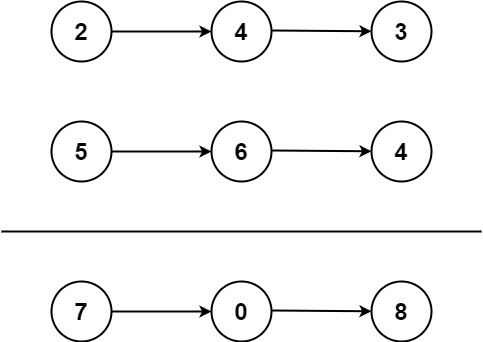2. Add Two Numbers
Description You are given two non-empty linked lists representing two non-negative integers. The digits are stored in reverse order , and each of their nodes contains a single digit. Add the two numbers and return the sumas a linked list.
You may assume the two numbers do not contain any leading zero, except the number 0 itself.
Example 1:
1 2 3 Input: l1 = [2,4,3], l2 = [5,6,4] Output: [7,0,8] Explanation: 342 + 465 = 807.
Example 2:
1 2 Input: l1 = [0], l2 = [0] Output: [0]
Example 3:
1 2 Input: l1 = [9,9,9,9,9,9,9], l2 = [9,9,9,9] Output: [8,9,9,9,0,0,0,1]
Constraints:
The number of nodes in each linked list is in the range [1, 100].
0 <= Node.val <= 9It is guaranteed that the list represents a number that does not have leading zeros.
Hints/Notes
Solution Language: C++
Recursive:
1 2 3 4 5 6 7 8 9 10 11 12 13 14 15 16 17 18 19 20 21 22 23 24 25 class Solution {public : ListNode* addTwoNumbers (ListNode* l1, ListNode* l2, int prev = 0 ) { if (!l1 && !l2) { return prev ? new ListNode (prev) : nullptr ; } if (!l1) { swap (l1, l2); } int sum = l1->val + (l2 ? l2->val : 0 ) + prev; ListNode* node = new ListNode (sum % 10 ); node->next = addTwoNumbers (l1->next, l2 ? l2->next : l2, sum / 10 ); return node; } };
Iterative:
1 2 3 4 5 6 7 8 9 10 11 12 13 14 15 16 17 18 19 20 21 22 23 24 25 26 27 28 29 30 31 32 class Solution {public : ListNode* addTwoNumbers (ListNode* l1, ListNode* l2) { ListNode dummy (0 ) ; ListNode* head = &dummy; int prev = 0 ; while (l1 || l2 || prev) { if (l1) { prev += l1->val; l1 = l1->next; } if (l2) { prev += l2->val; l2 = l2->next; } head->next = new ListNode (prev % 10 ); prev /= 10 ; head = head->next; } return dummy.next; } };
